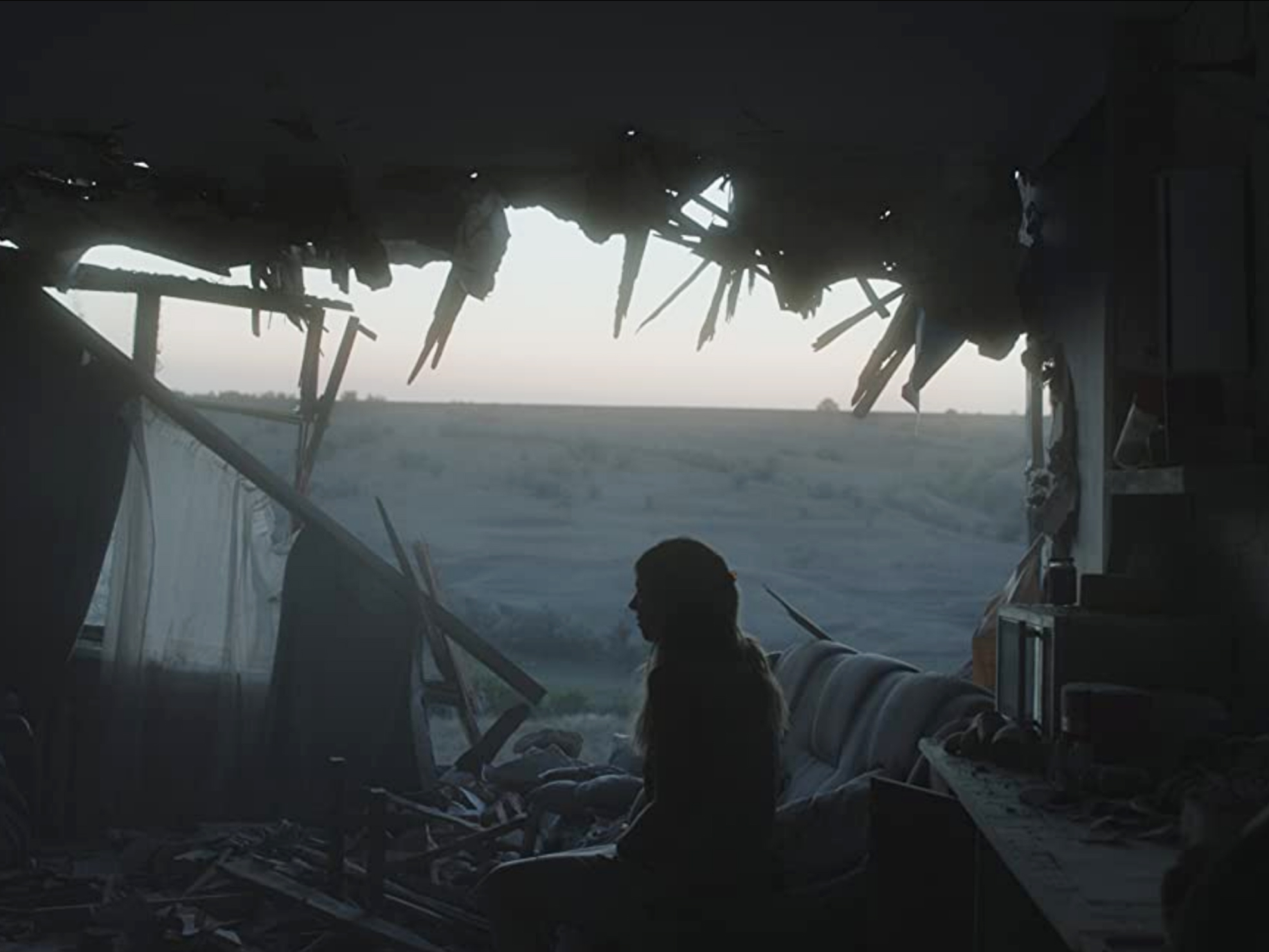
- Festivals
“Klondike”: A War Rush
“In the beginning was the Word” and the Word in Klondike was not about God.
Indeed, this movie begins on a black screen, and we hear a dialog between a man and a woman. Tolik (Sergey Shadrin) and Irka (Oxana Cherkashyna) are casually discussing whether or not to install a large window in the living room to cover a huge hole in a wall of their home. The first image that appears on screen is an idyllic picture of a southern beach with palm trees. It is the wallpaper in their home in Hrabove, a village in Eastern Ukraine that just happens to be in the middle of a conflict zone in the Donbas region. Despite this, the married couple is full of hope. They are expecting their first child, which matters more to them than the huge hole in the wall that was caused by an accidental grenade strike. If it weren’t for the damage, it would seem like the pictorial landscape of an endless field that was intended as interior design. But in reality, it is July of 2014, and it is very far from paradise.
Maryna Er Gorbach, who wrote and directed Klondike, her fourth feature, found a perfect way to show how the war literally came into the homes of the people of the Donbas region. Notably, this is the area where the Malaysia Airlines aircraft Flight 17 was shot down by Russia-supporting separatists, killing all 280 passengers and its 15 crew members. Er Gorbach was especially affected by this incident not just as a Ukrainian, but because it occurred on her birthday, giving her a sober reminder of the unending cycle of birth and death. Horrified by the global catastrophe, she felt a need to do something to stop feeling hopeless. Together with her husband, Turkish filmmaker Mehmet Bahadir Er, she created an independent production company and made the film in an effort to bring awareness and a better understanding of the conflict – within and outside of Ukraine.
The film’s title alludes to the Canadian Klondike Gold Rush, a period that attracted human ambition for personal wealth. Donbas, Er Gorbach believes, has attracted human ambition for bloodshed, entering a period she refers to as a “war rush.” Contrary to the Canadian Klondike that lasted only a couple of years, the war in Eastern Ukraine has been going on for more than eight, with no visible end. The filmmaker had a wide audience in mind while working on the film and wanted to bring universality to the story.
Tolik is protective of his pregnant wife and is eager to leave the area and find a safer home for her and their unborn child. “Let’s go to a place where there is no war,” he urges Irka, who is fiercely dedicated to their war-marked home she has cared for over the years. While Tolik argues with Irka’s brother and a neighbor who wants to join the war effort, Irka tends to the hearth, dusting the couch and calming down the family’s spooked cow after the sound of a huge crash. Even though the airplane has been shot down just outside her village, it’s only when she sees the news report on television that she incredulously asks, “Is there really going to be a war?”
The signs of war are all around. Wide shots that once presented pictorial landscapes now are being replaced by wide shots of a village cemetery that grows every day. In addition to the local casualties, there are hundreds of dead foreigners that are victims of the military strike. It seems that even the sunflowers have bowed their heads over dozens of black body bags that were down in their fields. The fallen aircraft’s wing makes it impossible to overlook the tragedy and turns this place into a memorial site. More and more family members from all over the world arrive in Hrabove to claim bodies, emphasizing the global reach of the conflict. Irka overhears a mother of a crash victim tell her husband, “I am sure she’s alive. I feel it.” As a mother-to-be, Irka also is unable to give up on her dream for happy family life. Leaving her home would be a betrayal of the love put into it. Femininity in the film serves as a beacon of hope, unwavering despite the dark reality; Er Gorbach even dedicates Klondike to women. The story is bookended with a black screen to underline the fact that life continues beyond the boundaries of a film’s runtime.
The film had its world premiere at this year’s Sundance Film Festival, which was held virtually due to COVID-19 concerns. It’s the first Ukrainian feature film to participate in the festival and was noted for its powerful depiction of a conflict many westerners know so little about. Er Gorbach was presented with the Directing Award in the World Cinema Competition.
What is next for the award-winning writer-director? Er Gorbach is very candid about one of the main purposes of creating this movie, telling me on text message, “After the screening of the film at the Sundance Film Festival, I would like big companies and studios with huge budgets to pay attention to this topic. And that when the trial is over, they will shoot a cool huge project – an investigative film. Like the one about Chernobyl by HBO. If somehow my film throws such an idea at them, I will be happy.”